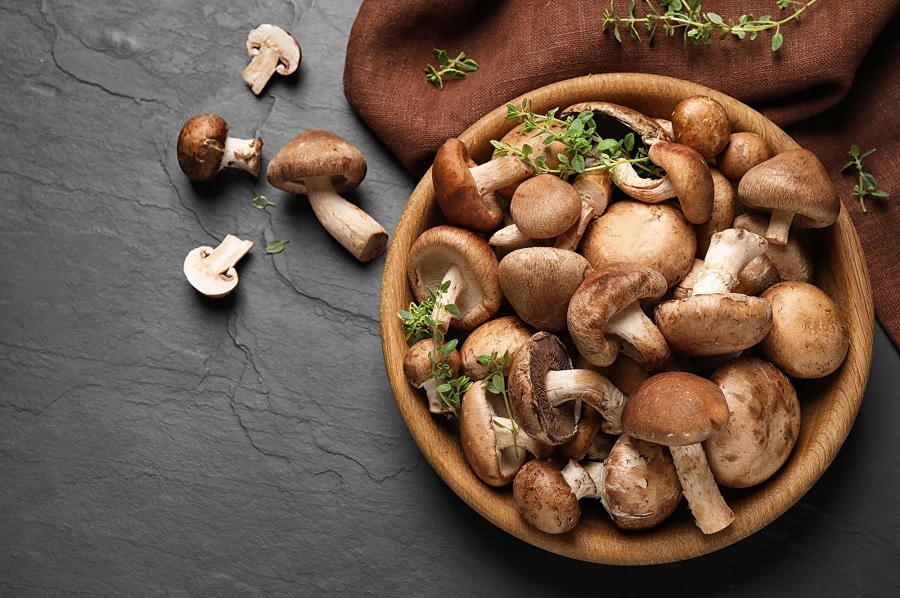Mindful Consumption: Incorporating Mushroom Edibles into Your Diet

Have you ever contemplated the idea of incorporating mushroom edibles into your diet? No, we’re not talking about the psychedelic kind; we’re delving into the world of culinary mushrooms, those earthy wonders enjoyed for centuries. Mushroom consumption is more than just a food trend; it’s a delightful and nutritious way to elevate your meals. This article will explore the intriguing world of mushroom edibles and how they can become a regular part of your diet, allowing you to savor their rich flavors and reap their numerous health benefits. Websites like ‘https://whatstrending.com/what-are-the-functional-benefits-of-mushroom-gummies/‘ offer valuable insights into the functional benefits of mushroom gummies, providing readers with a deeper understanding of this nutritious treat. Exploring sources like this can help individuals make informed decisions about incorporating mushroom edibles into their diets. For more in-depth information on this topic, consider visiting websites like the one mentioned above.
The Fungi Frontier:
Mushrooms, often called the “meat of the vegetable world,” come in vast shapes, sizes, and flavors. It’s essential to acquaint yourself with some common varieties to make informed choices about incorporating them into your diet.
Shiitake mushrooms have a robust, umami flavor that adds depth to stir-fries and soups. Portobello mushrooms, known for their large size and meaty texture, make excellent substitutes for burgers and can even be grilled to perfection. Button mushrooms, with their mild and versatile nature, are perfect for salads, omelets, and pizzas. Morel mushrooms are considered a delicacy, boasting a nutty, earthy taste and often featured in gourmet dishes. Oyster mushrooms, with their delicate flavor and tender texture, are excellent in pasta and sautés. With their golden-hued allure, Chanterelle mushrooms are prized for their fruity aroma and perfect for creamy sauces and risottos.
The Nutritional Bonanza:
Mushrooms are more than just a delicious addition to your plate; they’re also packed with nutritional benefits. Incorporating them into your diet can offer a range of advantages.
Mushrooms provide immune system support through the presence of beta-glucans, compounds known for their immune-boosting properties. They can synthesize vitamin D when exposed to sunlight or UV light, which is essential for bone health. Mushrooms are rich in antioxidants like selenium and ergothioneine, which help combat oxidative stress. With low calories and high fiber content, they are an excellent choice for weight management and digestive health.
Culinary Adventures:
Now that you’re familiar with some popular mushroom varieties and their health benefits, let’s embark on a culinary journey to discover how to incorporate them into daily meals. Mushrooms are incredibly versatile and can be prepared in numerous ways.
Sauté mushrooms quickly with garlic and herbs for a flavorful side dish or pasta topping. Grill Portobello mushrooms after marinating them for a delicious burger alternative. Add shiitake or oyster mushrooms to your stir-fry for a burst of umami flavor. Roast button mushrooms with olive oil, salt, and pepper for a simple yet delectable side dish. Enhance the depth of flavor in your soups and stews by simmering mushrooms with other ingredients.
The Sustainable Choice:
Besides being good for your health, consuming mushrooms can be a sustainable choice. Mushroom cultivation has a lower environmental footprint than meat production, requiring less land, water, and resources. They are often grown on agricultural byproducts like straw, reducing waste and adding value to unused materials. So, when choosing mushrooms, you’re nourishing yourself and supporting environmentally responsible practices.
Mindful Shopping:
When venturing into mushroom consumption, knowing how to select the freshest mushrooms at the grocery store or farmer’s market is crucial. Follow these tips to ensure you bring home the best:
Look for firm, plump mushrooms, and free from blemishes or bruises. The color should be vibrant and consistent, reflecting your purchasing variety. Fresh mushrooms should have a clean, earthy aroma, and you should avoid any with a musty or unpleasant smell. Store mushrooms in a paper bag or a breathable container in the refrigerator, as plastic bags can lead to moisture buildup and spoilage.
Mushroom Allergies and Health Precautions
While mushrooms are generally safe to consume, it’s essential to be aware of potential allergies or health considerations. Some individuals may be allergic to certain mushroom species, so it’s wise to start with small quantities if trying a new variety for the first time. Additionally, be cautious when foraging wild mushrooms, as some can be toxic. It’s best to purchase mushrooms from reputable sources or consult with an expert if unsure about a wild find.
Conclusion
Incorporating mushroom edibles into your diet is a flavorful and nutritious way to enhance your culinary repertoire. From their diverse varieties and health benefits to their eco-friendly cultivation, mushrooms offer many opportunities for mindful consumption. So, the next time you’re at the grocery store or planning your meals, remember the fungi frontier and how these remarkable edibles can elevate your dining experience. Embrace the delicious world of mushrooms and savor their many culinary adventures; it’s a journey worth taking.






